Related Research Articles

ETH Zurich is a public research university in Zurich, Switzerland. Founded in 1854 with the stated mission to educate engineers and scientists, the university focuses primarily on science, technology, engineering, and mathematics.

Bertrand Meyer is a French academic, author, and consultant in the field of computer languages. He created the Eiffel programming language and the concept of design by contract.
John Harry Goldthorpe is a British sociologist. He is an emeritus Fellow of Nuffield College, Oxford. His main research interests are in the fields of social stratification and mobility, and comparative macro-sociology. He also writes on methodological issues in relation to the integration of empirical, quantitative research and theory with a particular focus on issues of causation.

Noga Alon is an Israeli mathematician and a professor of mathematics at Princeton University noted for his contributions to combinatorics and theoretical computer science, having authored hundreds of papers.
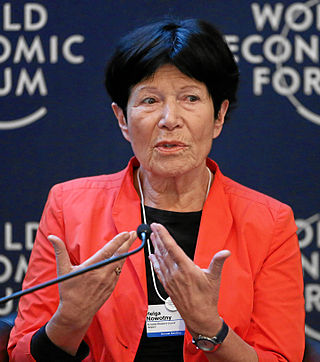
Helga Nowotny is Professor emeritus of Social Studies of Science, ETH Zurich. She has held numerous leadership roles on Academic boards and public policy councils, and she has authored many publications in the social studies of science and technology.
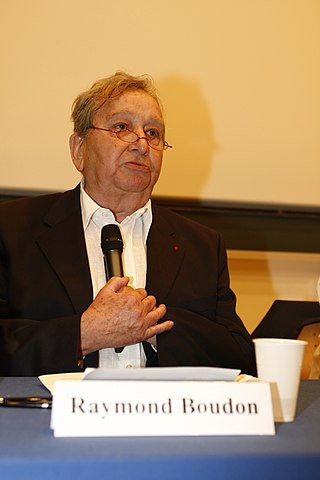
Raymond Boudon was a sociologist, philosopher and Professor in the Paris-Sorbonne University.

Dame Kay Elizabeth Davies is a British geneticist. She is Dr Lee's Professor of Anatomy at the University of Oxford and a Fellow of Hertford College, Oxford. She is director of the Medical Research Council (MRC) functional genetics unit, a governor of the Wellcome Trust, a director of the Oxford Centre for Gene Function, and a patron and Senior Member of Oxford University Scientific Society. Her research group has an international reputation for work on Duchenne muscular dystrophy (DMD). In the 1980s, she developed a test which allowed for the screening of foetuses whose mothers have a high risk of carrying DMD.
The following events related to sociology occurred in the 1980s.
Konrad Osterwalder is a Swiss mathematician and physicist, former Undersecretary-General of the United Nations, former Rector of the United Nations University (UNU), and Rector Emeritus of the Swiss Federal Institute of Technology Zurich. He is known for the Osterwalder–Schrader theorem.

Alan Carrington CBE, FRS was a British chemist and one of the leading spectroscopists in Britain in the late twentieth century.
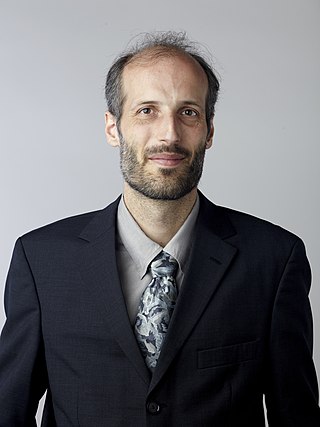
Sir Martin Hairer is an Austrian-British mathematician working in the field of stochastic analysis, in particular stochastic partial differential equations. He is Professor of Mathematics at EPFL and at Imperial College London. He previously held appointments at the University of Warwick and the Courant Institute of New York University. In 2014 he was awarded the Fields Medal, one of the highest honours a mathematician can achieve. In 2020 he won the 2021 Breakthrough Prize in Mathematics.

Nicola Ann Spaldin FRS is professor of materials science at ETH Zurich, known for her pioneering research on multiferroics.

Sara Anna van de Geer is a Dutch statistician who is a professor in the department of mathematics at ETH Zurich. She is the daughter of psychologist John P. van de Geer.
Véronique Gouverneur is the Waynflete Professor of Chemistry at Magdalen College at the University of Oxford in the United Kingdom. Prior to the Waynflete professorship, she held a tutorial fellowship at Merton College, Oxford. Her research on fluorine chemistry has received many professional and scholarly awards.
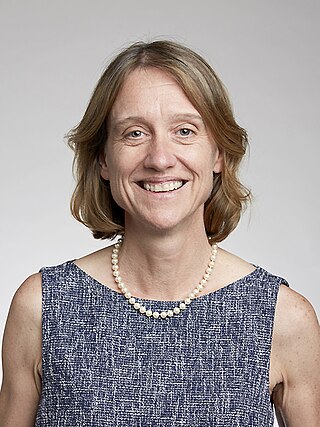
Julia Alison Noble is a British engineer. She has been Technikos Professor of Biomedical Engineering at the University of Oxford and a fellow of St Hilda's College since 2011, and Associate Head of the Mathematical, Physical and Life Sciences Division at the university. As of 2017, she is the chief technology officer of Intelligent Ultrasound Limited, an Oxford spin-off in medical imaging that she cofounded. She was director of the Oxford Institute of Biomedical Engineering (IBME) from 2012 to 2016. In 2023 she became the Foreign Secretary of The Royal Society.

Peter Lukas Bühlmann is a Swiss mathematician and statistician.
Arnout van de Rijt is Professor of Sociology at the European University Institute (EUI). Van de Rijt is known for his work on the Matthew effect and social network evolution. He is editor-in-chief of the journal Sociological Science. He is president of the International Network of Analytical Sociology.
Frank Lancaster Jones is an Australian sociologist specialising in social inequality, social stratification, social mobility, and national identity. He was Head of the Department of Sociology in the Research School of Social Sciences at the Australian National University (1972–2001) and has been the editor (1970–1972) and a co-editor (1990–1993) of the Australian and New Zealand Journal of Sociology. He was elected a Fellow of the Academy of the Social Sciences in Australia in 1974. During his career he played a pioneering role in the establishment and development of sociology in Australia.
Jörg Stolz is a Swiss and German sociologist, Professor of Sociology of religion at the University of Lausanne, Switzerland. His research mainly focuses on secularization, evangelicalism, and religiosity. He combines an explanatory approach with quantitative methods and mixed methods.
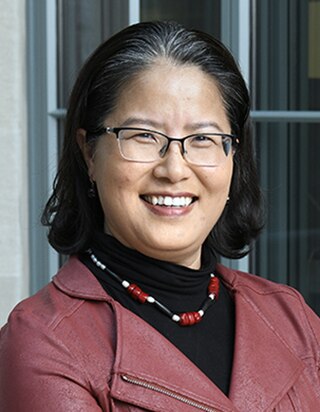
Songi Han is an American chemist who is a professor in the department of chemistry and biochemistry at Northwestern University. Her research considers electron and nuclear spins as sensors and detectors. She was elected a Fellow of the International Society of Magnetic Resonance in 2019 and president of the International EPR Society in 2020.
References
- ↑ Lindenberg, Siegwart (1 September 2002). "The European Academy of Sociology (EAS)". European Sociological Review. 18 (3): 369. doi:10.1093/esr/18.3.369.
- ↑ "European Academy of Sociology" . Retrieved 24 September 2023.
- ↑ Boudon, Raymond (1 September 2002). "Sociology that Really Matters: European Academy of Sociology, First Annual Lecture, 26 October 2001, Swedish Cultural Center". European Sociological Review. 18 (3): 371–378. doi:10.1093/esr/18.3.371.
- ↑ Schluchter, Wolfgang (1 December 2003). "The Sociology of Law as an Empirical Theory of Validity: European Academy of Sociology, Second Annual Lecture, Paris, November 16, 2002". European Sociological Review. 19 (5): 537–549. doi:10.1093/esr/19.5.537.
- ↑ Goldthorpe, John E. (1 April 2004). "Sociology as Social Science and Cameral Sociology: Some Further Thoughts: European Academy of Sociology, Third Annual Lecture, Paris, 25 October 2003". European Sociological Review. 20 (2): 97–105. doi:10.1093/esr/jch010.
- ↑ "European Academy of Sociology ~ Boudon Award Winners". www.european-academy-sociology.eu. Retrieved 2024-11-01.